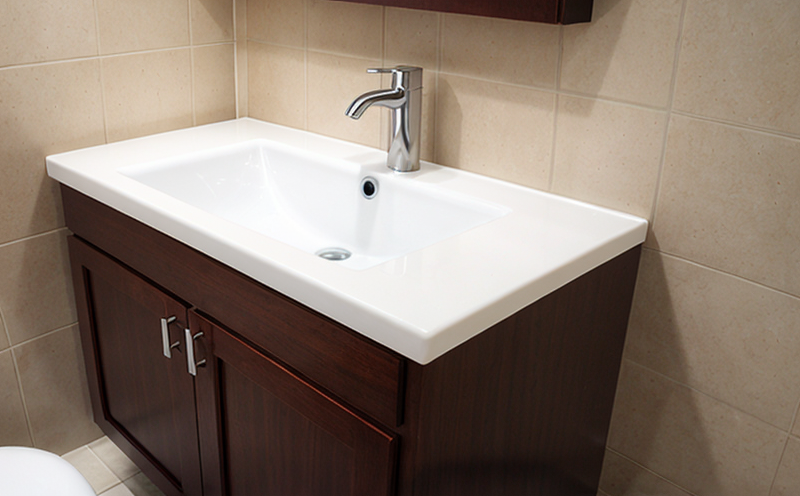ISO 10993-10 Irritation Testing of Sanitary Plastic Materials
The ISO 10993 family of standards addresses biocompatibility testing, which is critical for ensuring the safety and efficacy of medical devices. Among these standards, ISO 10993-10:2016 specifically focuses on irritation tests intended to assess the potential for adverse local effects when contact with a plastic material occurs.
In the context of bathroom and sanitary plastics, ISO 10993-10 is particularly relevant. This standard helps manufacturers ensure that their products do not cause skin irritation or other localized adverse reactions upon prolonged exposure during normal use.
The test procedure described in ISO 10993-10 involves several key steps:
- Specimen Preparation: The plastic specimens must be prepared according to the specific requirements of the standard. This includes ensuring that any coating or surface treatment does not interfere with the testing process.
- Test Specimen and Test Substances: The test involves placing a specified amount of the material in contact with a standardized rabbit ear, which is then observed for signs of irritation over time.
- Dilution Factor: Depending on the expected irritancy, the test can be conducted at different dilutions to determine the lowest concentration that does not cause irritation.
- Data Analysis and Reporting: The results are analyzed based on the appearance of erythema (redness) or edema (swelling) in the rabbit ear. The findings help in assessing compliance with the standard.
The importance of ISO 10993-10 cannot be overstated, especially for manufacturers and suppliers of bathroom and sanitary plastics used in products like shower curtains, bathtub liners, and other contact surfaces. By adhering to these standards, companies can ensure their products meet the highest levels of safety and quality.
Testing according to ISO 10993-10 not only protects consumers but also enhances brand reputation by demonstrating a commitment to product safety. This is particularly important in sectors where prolonged skin contact with materials is inevitable. The standard provides a robust framework for evaluating the biocompatibility of sanitary plastic materials, ensuring they meet stringent international standards.
Why It Matters
The safety and quality of bathroom and sanitary plastics are paramount. Irregularities in these products can lead to skin irritation or other adverse effects, which not only compromise user satisfaction but also pose significant risks to health and well-being. Testing according to ISO 10993-10 ensures that plastic materials used in such applications undergo rigorous evaluation for biocompatibility.
By conducting this test, manufacturers can identify any potential issues early on in the development process. This proactive approach helps prevent costly recalls and enhances product reliability. Moreover, compliance with international standards like ISO 10993-10 is a critical factor in gaining market access and maintaining consumer trust.
The standard's focus on irritation testing ensures that products are safe for prolonged use in direct contact areas such as shower curtains or bathtub liners. This testing helps ensure that the materials used do not cause any adverse reactions, thereby protecting the health of end-users.
Furthermore, ISO 10993-10 emphasizes the importance of accurate and consistent testing methods to provide reliable results. By adhering to these standards, manufacturers can demonstrate their commitment to quality and safety, which is essential for maintaining a positive brand image in competitive markets.
Scope and Methodology
The scope of ISO 10993-10 covers irritation tests specifically designed to assess the potential for adverse local effects when contact with plastic materials occurs. This standard is particularly relevant for bathroom and sanitary plastics used in products like shower curtains, bathtub liners, and other direct-contact surfaces.
According to ISO 10993-10:2016, the irritation test involves placing a specified amount of the plastic material in contact with a standardized rabbit ear. The test is conducted over a period of time, during which any signs of erythema (redness) or edema (swelling) are monitored and recorded.
The methodology for conducting this test includes several key steps:
- Specimen Preparation: The plastic specimens must be prepared according to the specific requirements of the standard. This includes ensuring that any coating or surface treatment does not interfere with the testing process.
- Test Specimen and Test Substances: The test involves placing a specified amount of the material in contact with a standardized rabbit ear, which is then observed for signs of irritation over time.
- Dilution Factor: Depending on the expected irritancy, the test can be conducted at different dilutions to determine the lowest concentration that does not cause irritation.
- Data Analysis and Reporting: The results are analyzed based on the appearance of erythema (redness) or edema (swelling) in the rabbit ear. The findings help in assessing compliance with the standard.
The test is conducted under controlled conditions to ensure consistency and accuracy. The use of standardized procedures and materials ensures that the results are reliable and reproducible, which is critical for maintaining high standards of quality and safety.
Eurolab Advantages
EuroLab offers comprehensive testing services tailored to meet the specific needs of manufacturers in the bathroom and sanitary plastics sector. Our expertise in ISO 10993-10 irritation testing ensures that we provide accurate, reliable, and compliant results for your products.
Our team of experienced professionals uses state-of-the-art equipment and adheres strictly to international standards, ensuring that every test is conducted with precision and care. This attention to detail guarantees that the results are accurate and can be relied upon for regulatory submissions or internal quality control purposes.
EuroLab's commitment to quality is further reflected in our comprehensive support services, which include detailed reports, recommendations for improvement, and assistance with compliance documentation. We understand the importance of meeting deadlines and ensuring that your products meet all necessary standards, which is why we offer flexible scheduling options to accommodate your testing needs.
By choosing EuroLab for ISO 10993-10 irritation testing, you can be confident in the reliability and accuracy of our services. Our expertise in this field, combined with our commitment to quality, ensures that you receive the highest level of service possible. Let us help you ensure that your bathroom and sanitary plastics meet the strictest international standards for biocompatibility.





